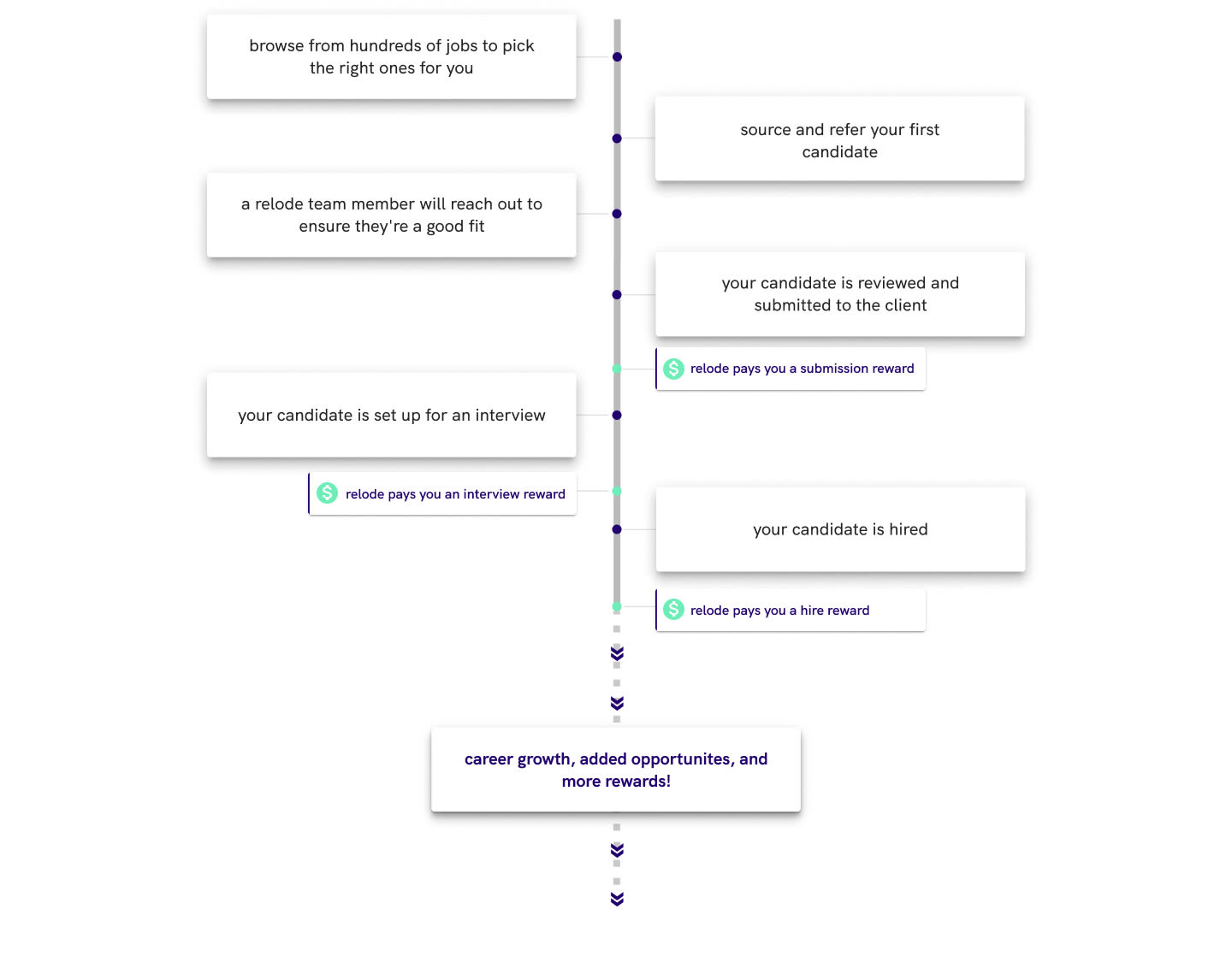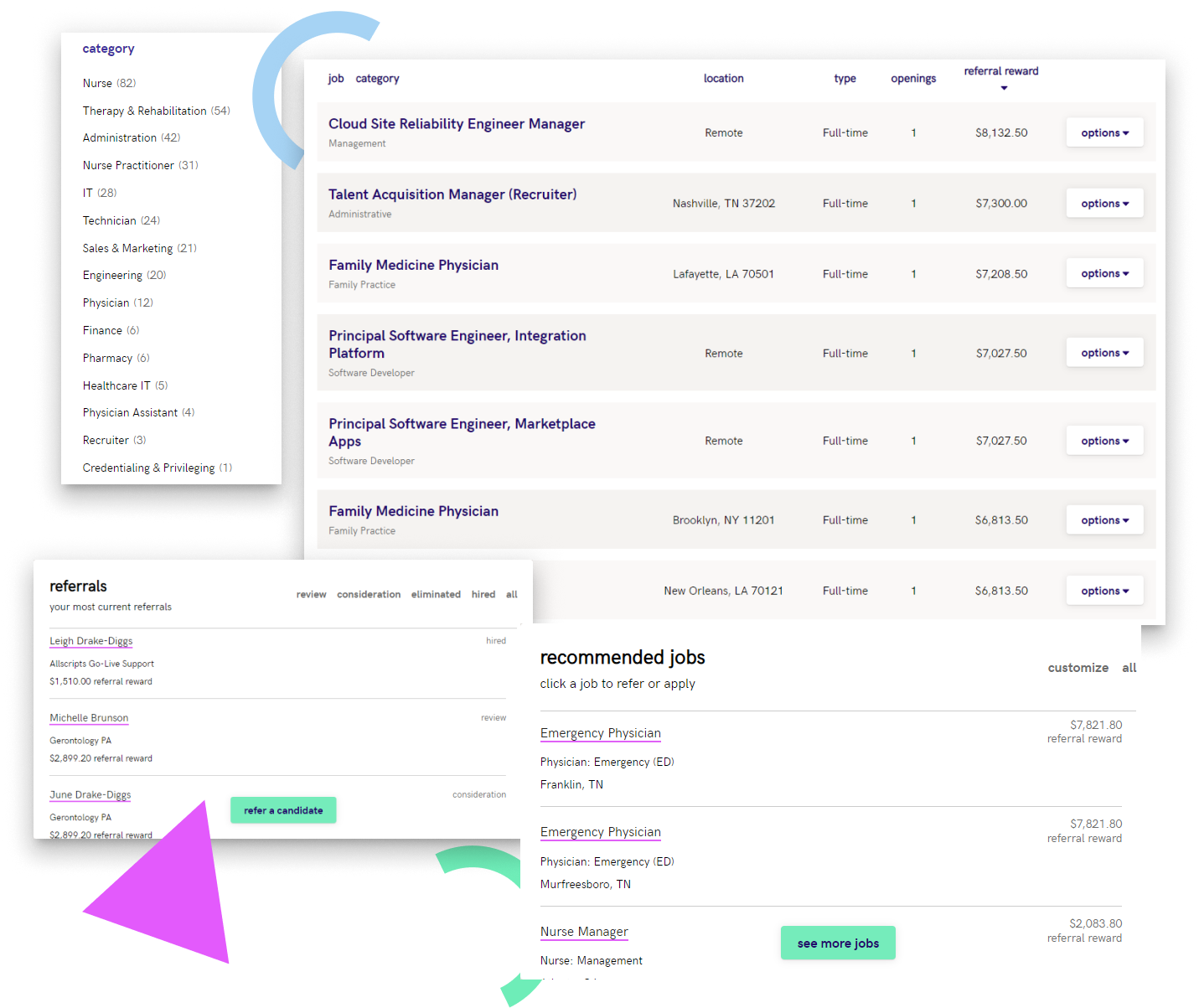Stepping into healthcare recruiting is a decision you can feel confident in. Healthcare is the fastest-growing industry in the US, and it’s constantly in need of talented professionals [*].
Hospitals, medical facilities, and healthcare practices have thousands of roles to fill. However, talent shortages were made significantly worse by the pandemic, leaving companies struggling to find new talent and deal with high employee turnover.
Regardless of the industry, experienced recruiters find and connect qualified candidates with organizations in desperate need of their expertise while making sure it’s the best fit for both parties.
So, if you’re interested in expanding your recruiting experience to include healthcare, you can pursue a lucrative new career or add it to your existing recruiter toolbelt with nearly unlimited earning potential.
Where do you start?
Use this checklist to start your journey to becoming a healthcare recruiter on your terms:
1. Choose the path that matches your goals
Healthcare recruiters don’t all follow the same route. Some decide to find an internal recruiting job with a hospital or healthcare organization. Others take their skills to a staffing agency, which has specific contracts to make placements for all types of healthcare companies.
However, individuals who are looking for more independence may opt to become independent recruiters or start their own businesses.

The benefit of being an independent or freelance recruiter is you create your own schedule -- moonlighting after your day jobs or making it your new full-time role, depending on your personal goals and time. You don’t have to deal with make-or-break quotas, constant deadlines, arbitrary metrics, or the commute to an office.
Interested in becoming a healthcare recruiter? Statistics show that average salaries for healthcare recruiters range between $50,000 and $75,000 per year. But that number could be higher, especially in a freelance role, if you learn the top skills to become a better recruiter and stay focused on what you know best.
Most healthcare recruiting is contingency-based. This means you typically receive half your payment when you make a placement and the other half after your candidate spends time with the company (say 30 or 60 days). So you’ll have to wait on your new hires to earn the full commission.
Some healthcare facilities may take beyond 60 days to pay invoices. So try to save at least six months’ worth of expenses before you quit a salaried position to venture off on your own to have a safety net.
The Relode virtual network is made up of experienced and hard-working recruiters and sourcers. Whether you're fully independent or are looking for additional ways to earn income with your recruiting skills, Relode provides a better experience.
We don't think you should have to wait for hires to earn for your time and effort. Our simple platform and proven process make it easy for you to refer talent and get paid. When you refer candidates, you’ll earn rewards each time they're submitted to a client, complete their first interview, AND get the job.

Once you decide which route you want to take -- either working as an employee for an agency or as an independent recruiter, you’ll then need to:
2. Find your niche
Healthcare is a rapidly evolving landscape with a lot of nuances. To be a successful recruiter and attract top candidates, you have to know what you’re doing and talking about.
You need a strong understanding of your candidates’ typical:
- Work responsibilities and functions
- Healthcare setting (ex. hospital, home care, private practice, etc.)
- Skills and abilities
- Required certifications, degrees, licenses, and work experience
- Job challenges
The best recruiters leverage their expertise in a particular niche to stand out. They’re up to speed on industry trends and know the correct healthcare terms and lingo to keep up with candidates and employers.
*Pro tip: Use resources like this one to find the meaning of common healthcare acronyms and abbreviations

For example, if you have experience managing nurses, you probably have an in-depth knowledge of what skills, certifications, and experience types employers are looking for in candidates.
You’re uniquely qualified to identify and sell what makes your candidate the best choice for the role.
If you don’t have healthcare experience, no worries! Hone in on one or two specialties and learn everything about them. This will help you connect with and establish credibility candidates, and make more placements.
Your specialty can even define your personal brand.
3. Create a personal brand to stand out
Healthcare recruiting is competitive. So how will you stand out to job-seekers and convince them you’re the recruiter they should trust?
A personal brand can help do this for you. Just like businesses use their branding and marketing to attract and engage customers, you can use your personal brand to:
- Highlight your qualifications
- Define your mission and values
- Encourage network connections
- Provide value to your target audience
- Establish your reputation
Candidates will be looking for this info on your website, social media pages, and LinkedIn profile before connecting with you. That means if you have little to no brand or social media presence, candidates will notice!
4. Advocate for solutions to industry challenges
Being your candidates’ number one fan is the best way to build a strong network of trusted referrals.
As the pandemic highlighted, healthcare is an incredibly demanding and stressful environment. Current national nurse turnover rates can be as high as 38% [*], and according to Relode's recent healthcare worker survey, 32% of nurses plan to leave the industry completely in the next 5 years.
Show your network that you care about helping solve issues in their industry and that you’re on their side. Help job seekers land their dream job and passive candidates realize that there might be something better out there.
Use your unique expertise to come up with creative solutions to:
- Recruit for diversity, equity, and inclusion
- Negotiate fair, equitable compensation and benefits packages
- Find organizations offering employees ongoing training and continuing education stipends
- Prioritize companies with mental health and wellness perks
Prove you can do this for candidates, and they’ll refer you to other professionals in their network (who you may also be able to place in better roles). Keep nurturing these relationships, and you will always have talent to refer when new positions open up. Word-of-mouth marketing will always make the biggest impact for you!
5. Let technology do the heavy lifting (+ save you time)
Most recruiting beginners are surprised to learn how long it takes to source candidates. Many spend the majority of their recruiting time on this task (some report 15+ hours per week).
Likewise, how you plan to organize and keep track of candidates in your pipeline also affects your efficiency. It’s essential to track who you’ve made contact with, which resumes have been sent, and who’s applied to or interviewed for roles.
A clunky sourcing process and applicant tracking system can limit the number of placements you make, which limits your earning potential.
Easily track and manage candidates in your pipeline with Relode. The Relode platform allows recruiters to browse jobs, find leads, refer candidates, and make the most of every minute.

You’ll be able to easily track, organize, and manage your pipeline in one platform so no one slips through the cracks.
If you want to break into healthcare recruiting, learn how to earn more on your terms with Relode. Work on any roles you want or narrow your focus to a specific position or market. Utilize your natural networking skills while benefiting from financial perks and the flexibility of working on your terms.
Leverage our state-of-the-art platform and healthcare recruiter certifications to make your career more rewarding than ever.
Get started ➡️ Learn more about joining the Relode network.